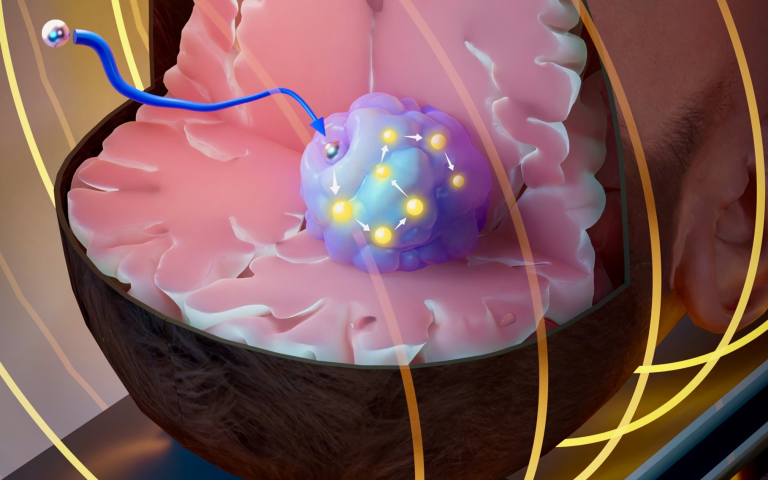Remotely heated, magnetically-guided hot seeds could be used to burn out brain tumours
23 March 2022
Medical Physics doctoral student is part of the research team leading the way in an innovative new treatment of tumours in some of the most inaccessible parts of the body

The 2mm seeds are guided through the brain using an MRI scanner before they are heated remotely and used to kill off cancer cells.
The work demonstrates the proof-of-concept for a novel cancer therapy called minimally invasive image-guided ablation (MINIMA).
The concept involves using the magnetic field gradients generated by a magnetic resonance imaging (MRI) scanner to navigate a ferromagnetic thermoseed (~2 mm in diameter) under image-guidance through tissue to a target, where it may be remotely heated to ablate the surrounding cancer tissue.
Rebecca Baker, a doctoral student in Medical Physic's i4health CDT who is part of the research team, explains the process:
“First, we demonstrate the use of a 1D MRI method to pinpoint the location of the thermoseed to within 0.3 mm accuracy. Next, several examples are presented of a thermoseed navigated through ex vivo porcine brain tissue, using magnetic field gradients of up to 300 mT/m. Finally, thermoseed heating was assessed in vivo in healthy (rat brain) and diseased (mouse subcutaneous tumour model) tissue, using a custom-built MR-compatible heating coil. Following 5 minutes of heating with a 2 mm thermoseed, subcutaneous tumours were completely ablated.
“Due to the minimally invasive nature of this technique, we hope that it may be used to treat deep-seated tumours that are otherwise inaccessible and to minimise side effects that patients experience with traditional treatment options.
“The next steps of the project involve translating the technique from our preclinical system onto a clinical MRI scanner."
Professor Mark Emberton, UCL Division of Surgery and Interventional Science - lead clinician in the study, said: "Improving the precision of our cancer treatments is arguably one of the greatest unmet needs we have today.
"One in eight men will be diagnosed with prostate cancer.
"While treatments such as radiotherapy and surgery can be effective, they often cause unwanted and debilitating side effects such as incontinence and impotence.
"Minima may allow us to precisely target and destroy prostate tumour tissue, reducing harm to normal cells."
 Close
Close

